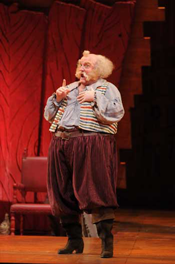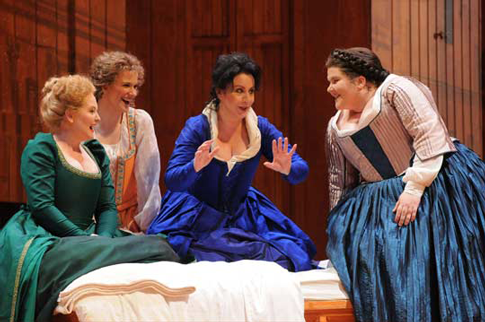
03 Feb 2008
Verdi's Falstaff at Chicago
There is nothing redeeming about Sir John Falstaff, one of Shakespeare’s most lively comic characters and the subject of Verdi’s final opera, and yet, inexplicably, we love him.
Anthony Minghella's visually-arresting staging, a co-production with New York's Metropolitan Opera and the Lithuanian National Opera, returned this month to its original home at the London Coliseum after a gap of two years.
While I eagerly seized upon an opportunity to hear Angelika Kirschlager live for the first time, having written in very recent weeks about not one but two of the star mezzo’s current CD releases, I ventured to Frankfurt’s Alte Oper feeling a little bit like her stalker.
When I worked in the Archives of the Met, I was custodian of several hundred costumes, many from the days when divas traveled with steamer trunks full of things run up just for them, by the finest designers, with the most glamorous materials, in the colors and styles that suited the ladies themselves.
What constitutes an “international opera star” these days, anyway?
The Metropolitan Opera audience loves its Wagner, and the management for the last several decades has, alas, made sure we aren’t spoiled: it’s a rare season that gets more than two production revivals of Wagner, and some years there have been none.
With her performance of the “Four Last Songs,” ably partnered by Michael Tilson Thomas and his San Francisco Symphony, Deborah Voigt emphatically confirmed her place as one of the glories of the current roster of Strauss interpreters.
John Adams, whose opera Nixon in China set the bar for post-minimalism in the lyric theatre, has once again scored a success with his latest work.
Wagner’s all-conquering chic made apocalyptic music-dramas drawn from folklore the ideal of the nationalistic era; every serious opera composer of the time felt obliged to attempt something in that line.
In this country art and politics are rarely bedfellows — strange or otherwise; indeed, it’s seldom that the two meet under the same roof.
Regarded, until the modern vogue for earlier masters, as the senior surviving grand master of opera, Gluck never quite becomes fashionable and never quite vanishes.
There is no middle ground in War and Peace — or, rather, it’s all middle ground, like a battlefield, and you may feel as if every soldier in Russia (and in France) has marched over you.
Once upon a time, we used to only dream about a stellar pairing like Barcelona’s Gran Teatre del Liceu has fielded for their current offering on display: “La Cenerentola.”
Enough ink was spilled last year gushing over Valencia’s new Calatrava-designed opera house and Arts and Science park that I had been chomping at the bit for the opportunity to take in a performance there as soon as my availability and, more important, the availability of a still-very-hard-to-find ticket coincided.
Do we too easily take Richard Strauss for granted? The question is prompted by the superlative production of “Frau ohne Schatten” that was the highlight of the fall season at the Chicago Lyric Opera.
Watching The Queen of Spades staged by a Russian company is often an unforgettable experience.
If Belfast in Northern Ireland isn’t a city that immediately springs to mind as a centre of musical excellence then it’s not for want of talent, initiative and professionalism within its cultural community.
After the triumph of his fifth opera, Ernani, Verdi could have gone on writing howling melodramas and made a mint.
Not long ago, English National Opera declared an intention to capitalise on its name and history by placing greater emphasis on English works.
Despite 19th-century Russia’s reputation as an Italian opera haven, Verdi’s late masterpiece Otello found acceptance there only with great difficulty, even though in its 1889 premiere the title role acquired a great local interpreter in the Mariinsky Theater primo uomo, Nikolai Figner.
At the curtain call for the first night of WNO’s new production of the infrequently performed Khovanshchina director David Pountney wore a simple Russian shirt.

There is nothing redeeming about Sir John Falstaff, one of Shakespeare’s most lively comic characters and the subject of Verdi’s final opera, and yet, inexplicably, we love him.
A bloated, insult-wielding drunkard who finds himself suddenly broke, he seeks to free himself from debt by wooing two wealthy women—both with the exact same love letter. When Alice Ford and Meg Page, the ladies in question, discover that they are being played for fools, they band together with the help of their friend Mistress Quickly and plan to dupe Falstaff. The musical result is one of the rare occasions when comic opera is actually funny. Played, as such evenings often are, to the blind in the 10th balcony, the laughs at Lyric are more often than not collective good-natured chuckles than guffaws of genuine surprise. Still, on opening night, the audience clearly enjoyed the opera’s style of comedy, investing in the show and audibly rooting for its favorite characters. This notion is further reinforced by Frank Phillipp Schlössmann’s Globe Theatre-inspired sets, which immediately transplant the audience into a world where a broader method of presentation is the norm. Costumes were traditional, but the bold colors contrasted beautifully with the amber-toned sets.
An audience can expect a thoroughly enjoyable evening of theatre—even if there are slight problems with the production—with a Falstaff from a top-notch company like Lyric Opera of Chicago. Picky imperfections in performance pale in the shadow of the brilliance of the work itself, obviously a labor of the composer’s love.
Like any comedy, a Falstaff is only as strong as its sense of ensemble, and, in something of a coup, by utilizing the brightly burning talents of current members of the Ryan Opera Center and supplementing them with the Center’s alumni, the administration has gathered a group of artists used to working with each other and who, out-singing most of the imported stars of the evening, present a tidy troupe. Even though director Olivier Tambosi fails to tighten the comic timing to sharp punctuality, the general mirth on stage more than carries the evening’s entertainment. Once again stepping forward with her booming voice, Meredith Arwady sparkles as Mistress Quickly, and her “Riverenza” scene inspired most of the genuine laughs of the evening. Elizabeth DeShong’s Meg Page is sprightly and attractive of voice. Of the current Ryan Opera Center’s roster, the most notable singer in this opera is Bryan Griffin, whose turn as Fenton is marked by a lyric tenor voice of both sweetness and strength, and Ryan Center alum Stacey Tappan’s crystalline Nannetta soars opposite Mr. Griffin. David Cangelosi, whose character tenor roles are well known at Lyric for their physicality, seems positively subdued next to the boisterous commedia dell’ arte characterization of fellow alumnus Rodell Rosel’s Bardolfo.
 Alice Ford (Veronica Villarroel, third l.) describes her plan to feign interest in Falstaff's wooing as Meg Page (far l.), Nanetta (second l.), and Mistress Quickly (far r.) listen with delight in Lyric Opera of Chicago's 2007-08 production of Falstaff.
Alice Ford (Veronica Villarroel, third l.) describes her plan to feign interest in Falstaff's wooing as Meg Page (far l.), Nanetta (second l.), and Mistress Quickly (far r.) listen with delight in Lyric Opera of Chicago's 2007-08 production of Falstaff.
Though not advertised as Megastars, one would expect the leads of this production to outshine the ensemble easily, but such was not the case. As Alice, Veronica Villaroel is not the plastic prima donna spinning measure after measure of line while ignoring the baser nature of the material; the Chilean soprano found some joy in even the subtler moments of the comedy. Neither is Villaroel the soprano with very little in the way of voice, but with star power to burn. (In fact, she sang Alice with no apparent strain.) Villaroel lands this role instead somewhere in the unfortunate pleasant-enough middle ground and manages neither to offend nor excite. Similarly, Andrew Shore in the title role perhaps does not have the wherewithal to color more lyrical moments with the vocal subtlety he intends; however, he does make a convincing Falstaff, barking and seducing at regular intervals. The audience may forgive the slow moving actor because of the additional costuming required to render him obese, but his physical comedy fell short of the standard set by other members of the cast. Boaz Daniel, on the other hand, as Signore Ford, turns in a thoroughly engaging vocal performance, his robust and appealing baritone easily launching itself expressively over the orchestra for his aria “È sogno? O realtà…”
Andrew Davis, conducting what the official press release calls his ‘’favorite Verdi opera”, keeps the evening well paced in this reviewer’s opinion. His tempi, though, may have been a little slow for those on stage; the singers consistently tried to rush the Act One finale. Granted: the Act One finale is incredibly difficult to keep together, and the cast does a noble job of trying, perhaps, though, it could stand to watch the bouncing head of hair up front a little more. Still, the opera itself is sung very well across the board, the stagecraft solid, and the evening spent in the Civic Opera House absorbing Verdi’s last masterpiece is well spent.
Gregory Peebles © 2008